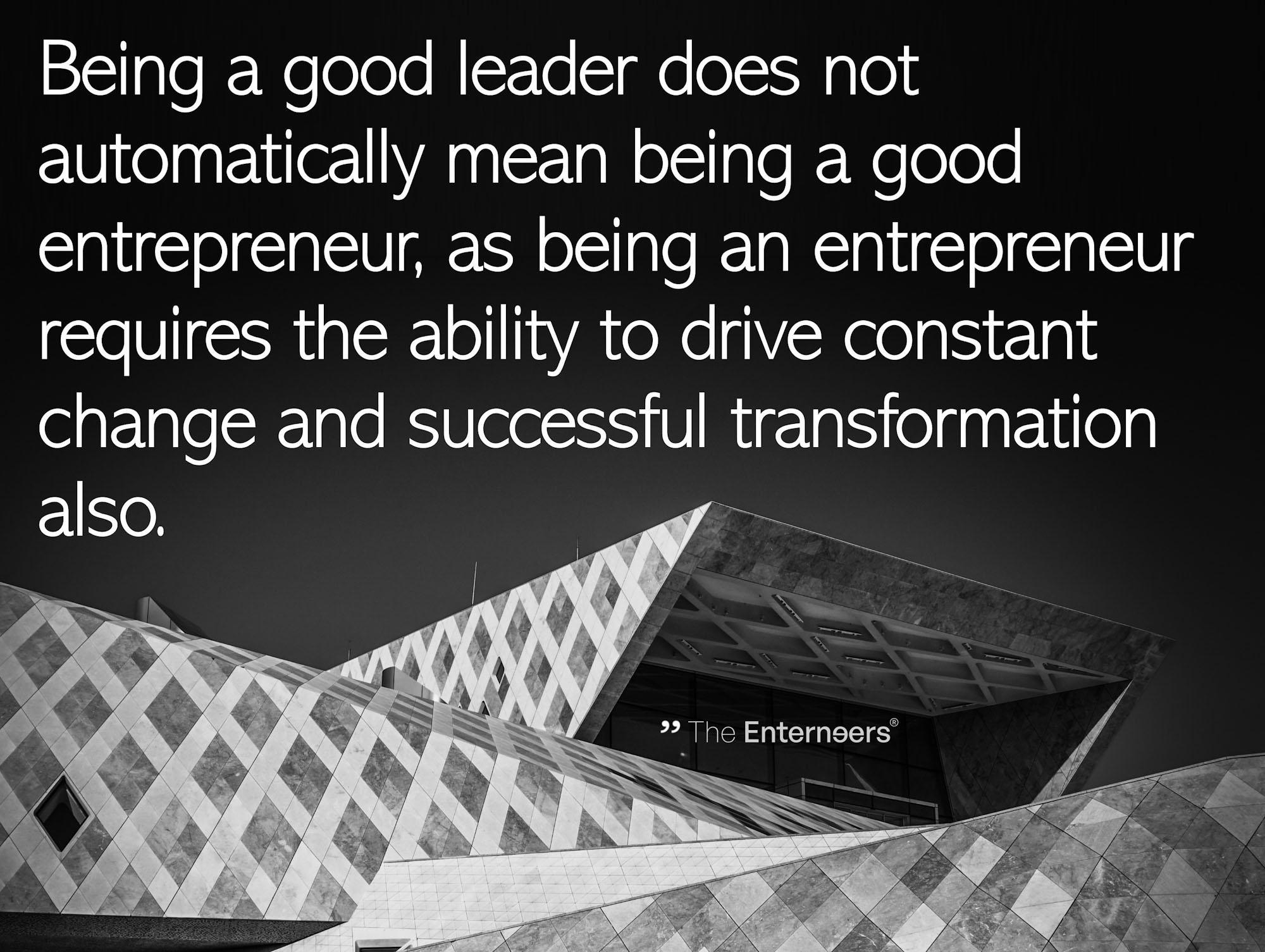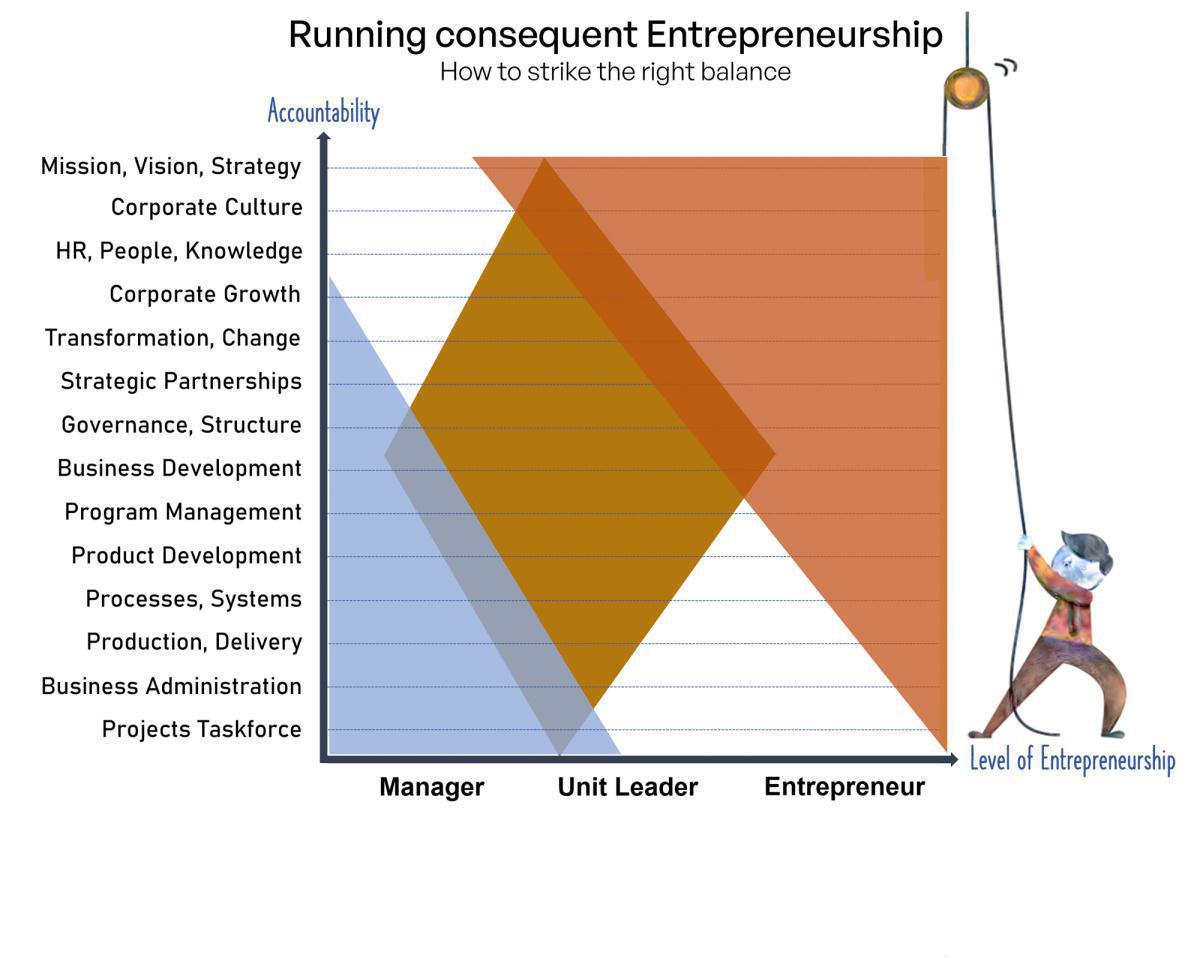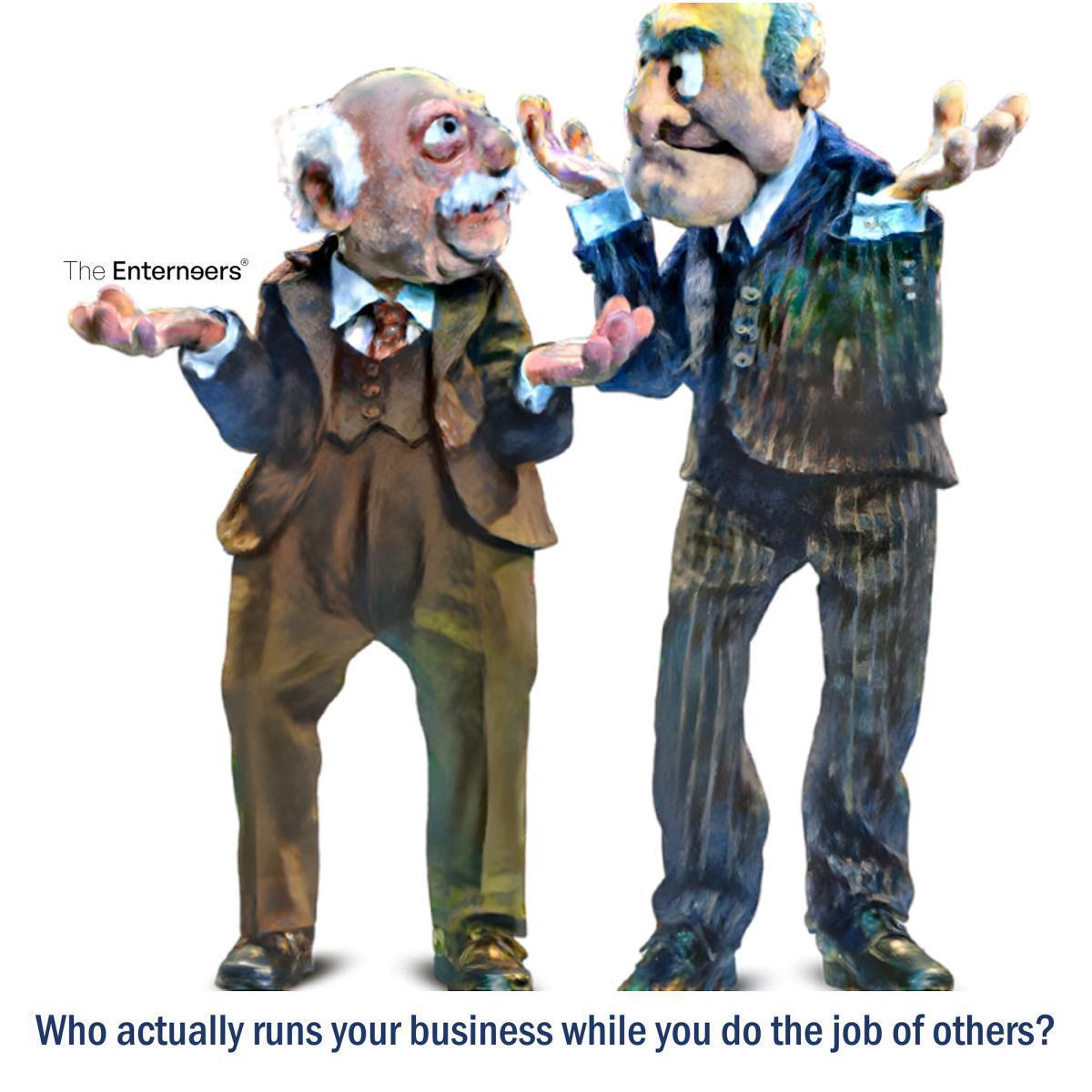Elements of Enterneering®/For Better Classification/Entrepreneurship, Leadership & Management
In the world of business, in various specialised media and in business studies, there is constant discussion about entrepreneurship, leadership and management. To effectively apply whatever is in Enterneering®, it will be helpful to know the similarities and differences between these three terms, as well as to understand the different tasks and roles associated with each of them. In addition, it is useful to understand in which role or at which level in the company one is acting at a given point of time, and how this may relate to effective management.
Entrepreneurship
A somewhat concise definition of entrepreneurship is: the endeavour to successfully market a business idea with a special personal commitment by consciously accepting personal risks, thus realising the most profitable results possible. However, this definition does not include the company and the organisational structure necessary for this, or the individuals working in it. An extension of this definition describes entrepreneurs as individuals who plan the establishment of an enterprise, successfully found such an enterprise, and manage as well as develop it, alone or together. Entrepreneurs usually bear most of the risk and enjoy most of the intended profits too.
In Enterneering® and its app, a holistic definition of the role of entrepreneurs is adopted. This inevitably leads to the definition of entrepreneurship. Entrepreneurs are individuals who have the necessary ideas, skills and above-average passion to identify customer needs and market opportunities and to transform them into profitable offerings. However, entrepreneurship also means creating the necessary framework and structures, as well as employing, empowering and developing suitable individuals together with the business organisation. Entrepreneurship means ensuring continuous improvement and change so that the needs and demands of the future (in addition to those of the present) can be successfully met. Entrepreneurs are people who take their professional development into their hands and actively steer it in the desired direction. They are willing to take responsibility for products, services, employees, capital, assets and the impact of their businesses on the environment. They are able to not only recognise and accept risks associated with the business but also handle their role with diligence and responsibility.
Leadership
Leadership involves deliberately and consciously stimulating or influencing people's experiences and behaviour in an organisation or society. Positive leadership is built on mutual respect, trust and appreciation. Successful leaders know that corporate goals can only be optimally achieved if the employees are motivated or, at best, enthusiastic about their work and are acting from inner conviction. Leadership thrives on cooperation and acceptance within the organisation, with leaders serving as good trainers for their teams. They empower their staff and stay away from micromanagement.
Successful leaders create an inclusive environment in the organisation, which promotes motivation and well-being. Leaders should pay attention to effectiveness and efficiency within their organisation and act as communicators. They support managers and staff in their personal development and actively shape performance within the team. Leaders should have a clear vision of the future development and goals of their organisation. They are able to advise their team based on their own professional skills. They must be able to communicate and collaborate effectively with the entire organisation and take confident decisions in their area of responsibility.
Many of the skills and attributes of a successful leader should also be present in successful entrepreneurs. Nevertheless, there are relevant distinguishing characteristics. While a leader's view and activities are focussed on their area of responsibility, organisational unit and the people working in it, the entrepreneur must broaden their perspective to encompass the entire enterprise, including all the people working in it. While the leader is concerned with the empowerment, development and performance of the managers and employees in their area or unit, it is the entrepreneur's task to deal with the personal development of their leaders. Entrepreneurs ensure the necessary changes in the company, formulate ambitious goals and embody the vision of the company. Also, they ensure changes in those areas that have only recently been successfully implemented by the managers and their teams and should not be subject to stagnation.
Management
Management refers to activities necessary for the targeted completion of tasks by individuals or teams. Management is based on basic activities such as planning, organising, leading, coordinating and controlling. It defines processes, tools and methods that enable people to perform effectively and achieve goals. Successful managers ensure that concrete tasks are fulfilled and actions realised. They ensure that deadlines and schedules are met, adhering to cost budgets and quality standards. Managers depend on effective empowerment of their field of activity by corporate management.
| Management: | Plan, organise and realise tasks. |
| Leadership: | Empowering, motivating and accompanying people. |
| Entrepreneurship: | Setting goals, driving change, empowering companies, shaping the future. |
Successful entrepreneurs drive growth and change, clarify priorities and expectations, define leaders’ roles and ensure that the structures and resources the employees need to accomplish their tasks are in place. Effective leadership in a company means stepping back from the day-to-day business and focussing on a clear strategy and vision – understanding the whats and whys. The hows should be left to the management and the team. This can be challenging for those entrepreneurs who are used to handling problems and putting out fires personally and managing from a reactive standpoint.
An oft-mentioned challenge for entrepreneurs is the mastering and continual adjustment of the never-ending balancing act between operational constraints and the targeted tasks for the bigger picture. It can be exhausting and energy-draining to constantly direct your attention to the outer, upper corner of the action matrix below.
In many cases, it is very helpful for entrepreneurs to consciously train themselves in developing an active understanding of their role in different situations in the company. Our app and the concept of Enterneering® follow this training approach. Entrepreneurs should know the most essential elements of successful work on their company and understand their characteristics and interrelationships. Many companies hire external consultants to deal with such elements. This is useful in terms of the expertise and additional resources available there, provided expectations and deliverables are clearly defined and effectively articulated.

However, some companies tend to ultimately delegate even core management tasks to external consultants, e.g. outsourcing the entire strategy development and documentation. In such cases, a major challenge arises in sustainably implementing and living such brought-in services as their own authentic elements of personal corporate governance. A better alternative to this is the involvement of an external coach or sparring partner at eye level. This refers to an advisor who has sufficient and relevant professional experience as a C-suite executive or entrepreneur and who can offer genuine constructive sparring to the company leadership.
Entrepreneurs often find themselves in situations where they should, or must, assume the role of a leader. Conversely, there must be enough situations in which they consistently embrace the role of an entrepreneur. The role of a manager, on the other hand, should be consistently avoided by effective entrepreneurs.
☝ Read the News post 'The new digital world needs more smart Enterprise Leaders' linked below.




